Essential oils, their medicinal properties
- Леся Ходієнко

- Apr 22, 2024
- 3 min read
Updated: May 15, 2024

Are essential oils just a pleasant aromatic addition, or are they powerful tools for maintaining health and beauty? Let's take a look at how their unique properties can positively affect the physical and emotional state of a person.
Plant flavors are caused by the presence of odorous substances – essential oils. Essential oils are multicomponent volatile odorous substances of plant origin. Common properties for all essential oils are a characteristic odor, a burning taste, good solubility in organic solvents and the ability to flavor water.
Essential oils are a mixture of many chemical components: esters, aldehydes, terpenes, ketones, phenols, etc. According to their basic composition, essential oils are divided into three groups:
hydrocarbon, i.e. rich in terpenes (essential oils of turpentine, lemon, etc.) – this is the most numerous group;
oxygenated (rose and mint oils);
sulfurized (oils of cruciferous plants, lily of the valley).
Many essential oils are a mixture of oxygen-containing substances: alcohols, ketones, phenols, etc. Therefore, essential oils can dissolve in both oils and alcohols and esters, but not all of them are soluble in water – they only transfer their aroma to it.
Most essential oils are extracted from fresh raw materials by distillation with water vapor – hydrodistillation. This is how peppermint, lavender, eucalyptus, and sage oils are made. Clove oil and some other oils are produced by simple pressing.
Therapeutic properties of essential oils:
Improving skin health – they have anti-inflammatory, antiseptic and healing properties that help fight a variety of skin problems;
help strengthen the immune system – antibacterial and antiviral properties help protect the body from infections and strengthen the immune system;
harmonization of mood – a powerful effect on the emotional state of a person, helping to relieve stress, improve mood, increase energy levels or create an atmosphere of relaxation and tranquility;
respiratory support – expectorant and anti-inflammatory properties that help to free up breathing, relieve coughs and reduce nasal congestion.

Since ancient times, both the Greeks and Romans considered olive oil to be the basis for the use of aromatic oils and essences, as it adsorbs and retains the scent of flowers, especially roses, daffodils, myrrh, and violets. Olive oil was also used by the Egyptians to prepare "herbal oil": aromatic herbs were heated in olive oil, which was then used to rub on the body. Such rubs included mint and frankincense, which were also used for medicinal compresses.
Seasonal tips:
Spring: In spring, it is especially useful to try lavender, rosemary, and lemon essential oils. They will help lift your mood, freshen the air in the room, and support your immune system.
Summer: On hot summer days, we recommend trying peppermint, lavender, and eucalyptus essential oils. They will help cool the skin, make breathing easier, and protect against insects.
Fall: Take cedarwood, ginger, and orange essential oils. They will help strengthen the immune system, relieve stress, and improve mood.
Winter: In winter, the body will need special support – essential oils of spruce, mandarin and clove. They will help strengthen the immune system, relieve fatigue and create a cozy atmosphere in the house.
Using essential oils in your daily routine can be a great way to maintain your health, beauty, and good mood at any time of the year. However, you should make sure they are safe and consult a specialist before using them, especially if you have any medical contraindications.



